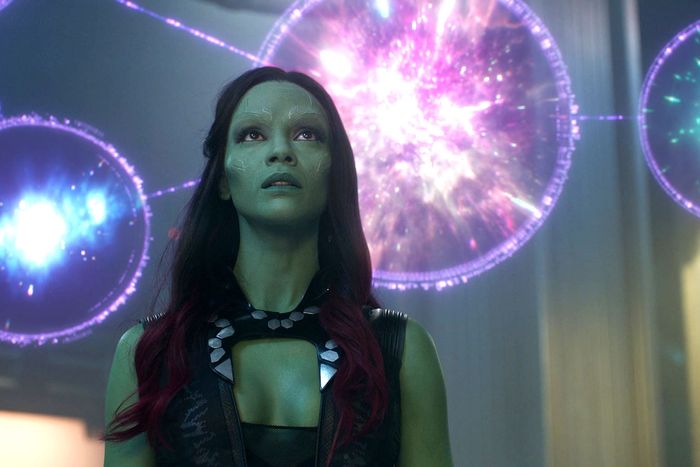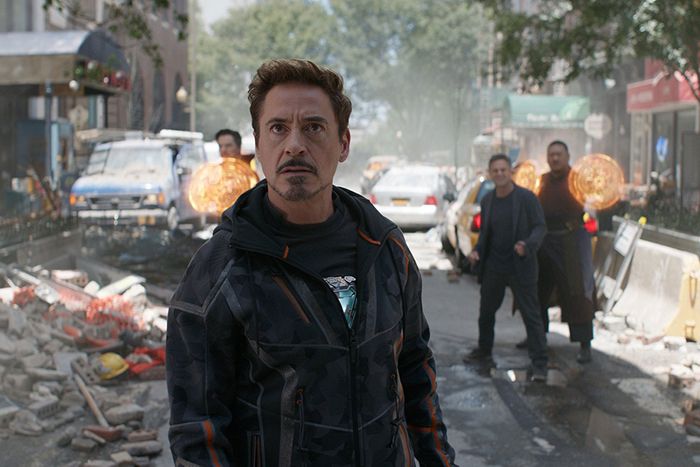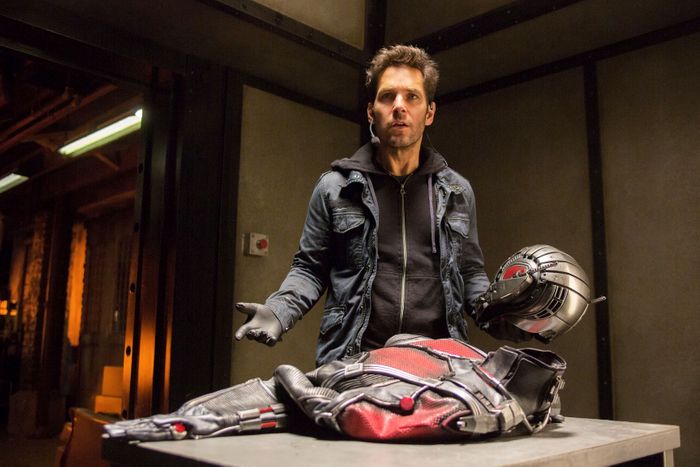
There are few things fans of the Marvel Cinematic Universe love as much as theorizing. Superhero abs, maybe? Even that is a close second. And no one can blame them — a decade’s worth of franchised movies and some 50-plus years of comic-book source material lends itself almost too well to the game of wild speculation.
Of course, as fans have become better and better at piecing together clues to guess whole plots of upcoming movies, Marvel’s grip on its unseen material has only gotten tighter — so tight that it’s become infamous for providing misinformation in trailers and teasers. Loose-lipped actors — looking at you, Tom Holland and Mark Ruffalo — have been given incomplete scripts with dummy scenes in them, all in the name of keeping secrets for opening night. (We’re not even going to mention the recent leaks, guys.)
But fandom is a machine that stops for no one — not even Thanos — and the promise of Endgame, a culmination of the 21 MCU movies before it, has brought out everyone’s speculative A game. In the spirit, we’ve collected some of the best Endgame theories out there, from the solemnly grounded in comic-book fact to the downright preposterous, to prepare for April 26 and the end of a pop-culture era. Here’s what might happen in the Phase 3 finale:
It’s all about the Soul Stone.
Since the end of Infinity War and the “decimation” of half the universe care of the Infinity Gauntlet, the specifics of the cinematic Soul Stone have been on everyone’s mind. It’s not just that it’s arguably the most esoteric of the already extremely esoteric lot of precious gems obsessed over by Thanos. (What does “Soul” mean in relation to concepts like “Time” or “Mind” or “Reality,” stones that grant their possessors, respectively, the ability to time travel, communicate telepathically, and break the laws of physics?) It’s also got some interesting quirks over in the comics world that make it ping nerd radar.
For one, the comic-book version of the Soul Stone is actually sentient. It has a will all its own and a motivation to consume souls, which it then transports to a sort of pocket dimension called the “Soul World.” Tickets to the Soul World are not always one way, though. It’s absolutely possible for heroes to be consumed and then spit back out, good as new. If this ability translates to the big screen, it could represent a get-out-of-jail-free card for the people who were turned to dust: The Soul Stone simply vacuumed them all up and, in the right hands, will easily be able to put them right back where they came from.
This theory is contingent upon someone who isn’t Thanos getting their hands on the Soul Stone and being able to use it — something that is probably a lot easier said than done. But based on the more recent Endgame trailers and released scenes, it seems like “using the stones to undo the damage” is the vague shape of the plan of the movie, so this one is very likely, if extremely dangerous. It should also be noted that, back in Infinity War, the Soul Stone is the one cosmic rock that required Thanos make a “sacrifice” before he could obtain it — a caveat that cost Gamora her life — so it goes to follow that whoever winds up using it next, even for a righteous purpose, would have to give something up, as well. Which brings us nicely to the next theory …
An original Avenger will die.
The conversation surrounding death in Endgame has been one of the loudest and most anxiety-producing in MCU history. In 11 years, the franchise has only killed a tiny handful of main characters, and absolutely none of the permanent deaths have been the original six Avengers. In effect, Marvel movies have been a pretty safe place for superheroes to exist — until Infinity War.
The oppressive sense that one of the core six will finally bite the dust in Infinity War’s sequel is founded in some real-world reason. Actor contracts are expiring and not being renewed. Chris Evans, specifically, has been vocal about saying good-bye to his character, Steve Rogers, and there have been vague rumblings of others finding their own finales in the film, too. But a completed contract doesn’t automatically mean that Captain America is going to die in Endgame; there’s philosophical reasoning behind this theory. If Endgame requires some type of great sacrifice for the greater good, which the Soul Stone certainly does, Steve Rogers is sort of an ideal candidate. If someone is willing to pay a price — say, his own life? — for the resurrection of the universe, it’s patriotic super soldier Steve, who’s always had a complicated relationship with living in these modern times.
The other popular bid for death is Tony Stark, the hero who started it all. Though Robert Downey Jr. has been less talkative about his post-Endgame departure than Evans, it would certainly be poetic for the MCU’s first character to be the one to provide the poignant, moving moment to close out this era. (Remember that time Tony tried to fly a nuclear weapon into outer space to save New York? He, too, has a penchant for self-sacrifice.) Just how many more stories does Tony have in him, anyway? Representing more concrete evidence for the theory is the fact that Doctor Strange foresaw 14 million outcomes to the Avengers fight with Thanos and foretold that they would only win in one — and that one scenario seemingly required that Tony live. Perhaps he lived to die another day?
More recently, a redditor who uses the handle u/TheRealBrandini97 put forth a theory that not only will both Captain America and Iron Man die but a total of four of the original Avengers will perish in Endgame. Why? The redditor noted that the phrase “Whatever it takes” is repeated several times in the film’s trailer, but only by Iron Man, Captain America, Black Widow, and Hawkeye. Black Widow is set to be featured in an upcoming stand-alone film, but if it’s a prequel as has been suggested, she could stand to pass in Endgame. And Hawkeye is now operating under the alias Ronin, so he probably means business. What we’re saying is, primary character death is inescapable!
Time travel will defeat Thanos.
A happier Endgame alternative to a major sacrifice for the sake of the Soul Stone is a total do-over care of either the Time Stone or the Quantum Realm — which might actually make this whole situation even more complicated. The basics of the Time Stone theory are pretty self-explanatory; just as the Soul Stone, it requires someone get the stones out of Thanos’s hands, and use one to undo the damage. The Time Stone would then allow for the team to rewind events all the way back through Infinity War … or perhaps even further. The question is, which pivotal moment would we land on? Imagine if Peter Quill hadn’t had his little breakdown just as the team was about to yank the Gauntlet off Thanos’s hand? Just how far back do we need to go?
There’s some precedent in the comics that suggests the Time Stone is a bit of a wild card. In past cases when the stones have been destroyed, the Time Stone has simply teleported to a new portion of the timeline where it’s safe. And let’s not forget that it was previously in the hands of Doctor Strange, who did pointedly see the one scenario in which the Avengers were able to win this thing back in Infinity War. Maybe he used some sort of magic to protect or transport a copy of the stone through time? Either way, it feels important.
But the potential Quantum Realm part of this time-travel equation is where things get sticky. For one thing, the whole Quantum Realm (or the Microverse, as it’s also called) is as ill-defined and full of comic-book mumbo jumbo as the Soul Stone. We know thanks to Ant-Man and the Wasp that it can bend reality in a whole bunch of ways, from allowing possession of bodies and sharing of memory across time and space to bestowing almost mutantlike abilities on the people who visit. We also know that, somehow, Scott Lang managed to escape after he was inadvertently abandoned there thanks to Thanos’s snap. According to a recent trailer, he makes it back to Avengers headquarters, Microverse van and all.
So is entering the Quantum Realm the key to undoing Thanos’s decimation without using the Stones themselves? (As far as we know, you need either magic à la Doctor Strange or the ability to shrink to a subatomic level to get into the QR. So what are these wrist devices?) Perhaps it would allow the Avengers to communicate key information to their past selves and turn the tides of their fight. Or, you know, initiate some other sort of wacky metaphysical escape clause. There aren’t any real rules when it comes to the Quantum Realm, which probably made it an all-the-more-appealing choice for Endgame’s writers and directors.
A second-stringer will defeat Thanos.
Another potential, if slightly less likely outcome, would be a majorly heroic Endgame moment from one of the Avengers outside of the core six. Captain Marvel, perhaps? It would make a lot of sense for Carol, a newcomer to the MCU, to make a big splash as we head into the next phase of the franchise, considering she’ll almost certainly be one of the main anchors for whatever team rises from the Endgame ashes.
It also helps that Carol’s powers are inherently linked to the Infinity Stones, a handy tidbit that was explored in Captain Marvel last month. As we’ve seen in Infinity War with Wanda Maximoff, the only other human hero in a similar position, people who were empowered by the Stones are actually able to both hold them off and destroy them. The fact that Carol’s abilities came from the Tesseract lends the possibility a certain sort of symmetry, considering the Tesseract’s special position as the first real Stone to appear in the shared universe at all. It could be a nice bookend to give Carol a powerhouse moment while also calling back to the start.
(This is a good time to mention that Tessa Thompson’s Valkyrie is reportedly still alive.)
Bonus: The Thanos Protocol.
And, failing all else, there are, uh … other possibilities. If you exist on the internet at all, you’ve probably, sadly, heard this one: Ant-Man’s shrinking and growing powers could very easily defeat Thanos by allowing someone to miniaturize themselves, enter the purple giant’s body via a particular orifice and then make a gloriously violent exit by reverting to their non-miniature size while inside of him. It’s been nicknamed the “Thanus Protocol” for good reason, and it’s become a meme that even Josh Brolin and the Russo brothers themselves have gotten in on. This almost definitely (hopefully) isn’t going to happen but, look … maybe just keep an eye on Ant-Man in Endgame. A whole lot can happen in three hours and two minutes.





